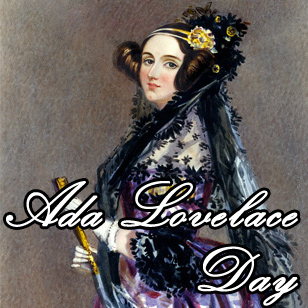 NEWS
NEWS
 NEWS
NEWS
 NEWS
NEWS
![]() Ada Lovelace (1815-1852) is often considered the first programmer in the world. For five years, the initiative of Ada Lovelace Day has offered to share the stories of women and recognize their contributions in the field of Science, Technology, Engineering, and Mathematics (STEM). Every year around October 15, Ada Lovelace Day is celebrated through events organized around the world.
Ada Lovelace (1815-1852) is often considered the first programmer in the world. For five years, the initiative of Ada Lovelace Day has offered to share the stories of women and recognize their contributions in the field of Science, Technology, Engineering, and Mathematics (STEM). Every year around October 15, Ada Lovelace Day is celebrated through events organized around the world.
Augusta Ada Byron, better known as the Countess of Lovelace, daughter of poet Lord Byron and born in England in the nineteenth century, had its name remembered throughout all this time to have succeeded in creating the first computer program in the world. Ada was one mathematical autodidact who developed algorithms for the analytical engine of Babbage, the first computer in history.
After a chance encounter when aged 17, Ada became friends with Charles Babbage and grew fascinated by his idea to build an “Analytical Engine.” In 1843 Ada published a description of Babbage’s machine. While partly a translation of an Italian work, Ada added voluminous self-penned notes, which made up the bulk of the document. Included in her notes were step-by-step instructions for how the machine could calculate a sequence of Bernoulli numbers, prepared in collaboration with Babbage.
Most importantly, the notes set out Ada’s far-reaching vision for what the Analytical Engine signified. While Babbage saw it as a mathematical calculator, Ada understood it had much more potential. She realized it was, in essence, a machine that could manipulate symbols in accordance with defined rules, and—crucially—that there was no reason the symbols had to represent only numbers and equations. Ada envisaged a day when a single machine would be capable of a myriad of tasks, limited only by the creativity of its programmer.
Event across the world – Finding Ada
The Ada Lovelace Day is celebrated around the world since 2009, on the initiative of journalist and writer Suw Charman-Anderson, who has linked to the figure of the woman recognized as one of the top minds of modern computing initiative of visibility for the achievements of women in science and technology.
Ada Lovelace Day is an international day to draw attention to women excelling in technology. Women’s contributions often go unacknowledged, their innovations seldom mentioned, their faces rarely recognized.
Finding Ada is an unfunded organization supporting the work of Ada and women in STEM fields. Finding Ada community is a passionate one, full of women in technology and science in particular, as well as men who are interested in learning how to write, plan and give presentations. Finding Ada hopes to help women gain confidence in their speaking ability and draw attention to the huge number of smart, knowledgeable women in the tech industry who are just itching to get up on stage and share their expertise.
According to the Ada Lovelace Day website, a study conducted by psychologist Penelope Lockwood found that women benefit from having female role models more than men do from having males to look up to. Outstanding women can function as inspirational examples of success, illustrating the kinds of achievements that are possible for women around them. They demonstrate that it is possible to overcome traditional gender barriers, indicating to other women that high levels of success are indeed attainable.
This year, universities and other groups in Europe and North and South America are hosting events to celebrate Ada Lovelace Day. The team at Finding Ada is once again gearing up for Ada Lovelace Day Live! 2013, which will be held at Imperial College, London, at 6pm on Tuesday 15 October.
This year, Finding Ada is joined by two new partners, the Biochemical Society and Imperial College London. The Biochemical Society works to promote the molecular biosciences and support those who work in the sector. Imperial College London is a world leader in research and education in fields including science and engineering and aims to train scientists today to deal with the quickly-developing challenges of the future.
Some of their special guests for this year are Fran Scott, TV science demo inventor; Professor Sophie Scott, neuroscientist; Leila Johnson, technology writer and maker; Professor Molly Stevens, bioengineer; and Hazel Gibson, geologist.
In addition to ALD Live in London, the Ada Initiative will present an interdisciplinary conference celebrating the work and life of Ada Lovelace at the Stevens Institute of Technology, Hoboken, New Jersey on 18 October.
This is therefore more a day to celebrate the increasingly growing involvement and recognition of women in science and technology.
Happy Ada Lovelace Day!
Support our mission to keep content open and free by engaging with theCUBE community. Join theCUBE’s Alumni Trust Network, where technology leaders connect, share intelligence and create opportunities.
Founded by tech visionaries John Furrier and Dave Vellante, SiliconANGLE Media has built a dynamic ecosystem of industry-leading digital media brands that reach 15+ million elite tech professionals. Our new proprietary theCUBE AI Video Cloud is breaking ground in audience interaction, leveraging theCUBEai.com neural network to help technology companies make data-driven decisions and stay at the forefront of industry conversations.